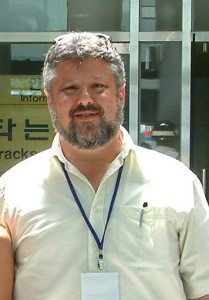Gershon Baskin believes that Sharon’s biggest political achievement was the reshaping of the political map in Israel and the distance between right and left in Israel shrunk considerably under Sharon, forcing the rise and the significance of the center of the map.
It was in answer to a reporter’s question in January 2002 that Ariel Sharon first unveiled his desire to transform himself from warrior to peacemaker.
“I’ve been around the world, I’ve met with kings and presidents and prime ministers and ministers,” he said. “I’ve been now 20 years in the government. I don’t have any political ambitions anymore. I had one thing that I wanted to accomplish, and that’s to reach a political settlement which will lead to peace with the Palestinians and with the rest of the world.”
A man of peace? Almost no one who knew his record as one of Israel’s most fervent hawks took him seriously then. Yet that may turn out to be his most enduring legacy.
By the time Sharon was debilitated by a massive stroke Wednesday, he had already taken controversial actions in Gaza and the West Bank that could lead to Palestinian statehood. By calling new elections in March, he was trying to engineer an ambitious shift to the center of Israel’s political spectrum, where the “two-state solution” has wide appeal. As Israelis waited Saturday for news of his health, they also were coming to terms with the reality that achieving Sharon’s last, most ambitious goal might be left to others.
Even Caroline Glick, a right-wing commentator for the Jerusalem Post who had become one of Sharon’s harshest critics over the withdrawal of settlers from the Gaza Strip, acknowledges the political skills that became a leading asset.
“One of Sharon’s greatest strengths was his ability to form coalitions of people from disparate backgrounds and political camps and move them forward to achieve goals that appeared impossible to attain,” said Glick. “Now, with Sharon no longer leading the country, our political leaders must find a way to act in a similar manner. The future of the state depends on their success.”
When he gave Israelis a glimpse of his vision in 2002, Sharon already had fought ruthlessly in Israel’s wars against its Arab neighbors, then entered politics as a leader of the hawkish Likud party. He became the godfather of the Israeli settlement movement in the West Bank and Gaza Strip. As defense minister, he was the architect of the ill-starred 1982 operation that sparked the Lebanon war. His actions in Lebanon prompted then-Prime Minister Menachem Begin‘s resignation. And they led to Sharon’s dismissal in disgrace for misleading the Cabinet and doing nothing to stop the massacre of Palestinians at Sabra and Chatilla refugee camps by Christian militiamen.
By the 1990s, Sharon was opposing the Oslo Accords that started the peace process between Israel and the Palestinians, urging settlers to “grab the hilltops” in order to forestall any territorial compromise. In September 2000, he was widely blamed for sparking the second Palestinian uprising, or intifada, by his provocative tour of the historic heart of ancient Jerusalem, known by Jews as the Temple Mount and by Muslims as the Noble Sanctuary.
Still, when he was elected prime minister in early 2001, the blustering ex-general had matured into a wise and wily politician. Perhaps even a statesman.
Instead of using the onslaught of suicide bombings and Israel’s unyielding military response as a rationale to retrench into old right-wing doctrines, Sharon pushed forward, borrowing liberally from the policies of Labor Prime Minister Ehud Barak, whom he beat in 2001, and Amram Mitzna, the new Labor leader he defeated in the 2004 general election.
First, he crushed the intifada through both military and intelligence means. He convinced President Bush that longtime Palestinian leader Yasser Arafat was not a sincere partner for peace.
Then he introduced two innovations in Israeli policy: the construction of the security barrier dividing Israel from the West Bank (Barak’s idea) and the withdrawal of settlers and their military protectors from Gaza (Mitzna’s election platform).
Robert Satloff, director of the Washington Institute for Near East Policy, said Sharon’s third innovation — the creation of the new Kadima party out of defectors from both his Likud party and Labor — came from his “understanding the deepest political currents in Israeli society and creating a political party that actually reflects the disillusioned centrism of the plurality of Israeli voters.
“Bequeathing the country a unified, cohesive centrist movement would be a fitting last act,” said Satloff.
Gershon Baskin, founder of the left-wing Israel-Palestine Center for Research and Information, said that after years of opposing Sharon’s policies, he found himself in recent months “apologizing for sounding too much like a spokesperson for Sharon.”
“Sharon’s biggest political achievement was the reshaping of the political map in Israel,” said Baskin. “The distance between right and left in Israel shrunk considerably under Sharon, forcing the rise and the significance of the center of the map. Sharon and his Kadima party captured the center ground, which is where the majority of Israelis reside today.
“Kadima may have been perceived as a one-man party,” he added, “but in reality, the need for the party that was created by the ‘one man’ remains even after the one man is no longer available to lead it.”


